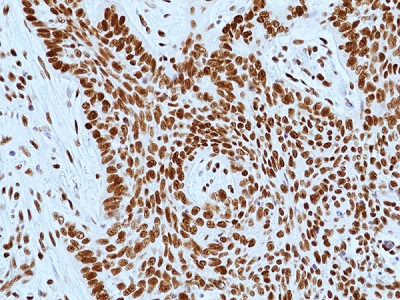anti-DNA-PKcs (human), Rabbit Monoclonal (RM505)
| Code | Size | Price |
|---|
| REV-31-1397-00-R100 | 100 ul | £455.00 |
Quantity:
Prices exclude any Taxes / VAT
Overview
Host Type: Rabbit
Antibody Isotype: Rabbit IgG
Antibody Clonality: Recombinant Antibody
Antibody Clone: RM505
Regulatory Status: RUO
Target Species: Human
Applications:
- Immunohistochemistry (IHC)
- Western Blot (WB)
Shipping:
Blue Ice
Storage:
Short-term: 4°C. Long-term: -20°C.
Images
Documents
Further Information
Alternate Names/Synonyms:
DNA-dependent Protein Kinase Catalytic Subunit; PRKDC; DNPK1; p460
EClass:
32160000
Form (Short):
liquid
Formulation:
Liquid. 50% Glycerol/PBS with 1% BSA and 0.09% sodium azide.
Handling Advice:
Avoid freez/thaw cycles.
Immunogen:
A peptide corresponding to the C-terminus of human DNA-PKcs.
Long Description:
Recombinant Antibody. This antibody reacts to human DNA-PKcs. Isotype: Rabbit IgG. Immunogen: A peptide corresponding to the C-terminus of human DNA-PKcs. Application: IHC, WB. Liquid. 50% Glycerol/PBS with 1% BSA and 0.09% sodium azide. DNA-dependent protein kinase (DNA-PK) is an important factor in the repair of double-stranded breaks in DNA. Cells lacking DNA-PK or in which DNA-PK is inhibited fail to show proper nonhomologous end-joining (NHEJ). DNA-PK is composed of two DNA-binding subunits (Ku70 and Ku86) and one 450 kDa catalytic subunit (DNA-PKcs). It is thought that a heterodimer of Ku70 and Ku86 binds to double-stranded DNA broken ends before DNA-PKcs binds and is activated. Activated DNA-PKcs is a serine/threonine kinase that has been shown to phosphorylate a number of proteins in vitro, including p53, transcription factors, RNA polymerase, and Ku70/Ku86. DNA-PKcs autophosphorylation at multiple sites, including Thr2609 and Ser2056, results in an inactivation of DNA-PK kinase activity and NHEJ ability and may play a role in disassembly of the DNA repair machinery. Autophosphorylation at Thr2609 has also been shown to be required for DNA-PK-mediated double-strand break repair, and phosphorylated DNA-PK co-localizes with H2A.X and 53BP1 at sites of DNA damage. Phosphorylation at Ser2056 occurs in response to double-stranded DNA breaks and ATM activation. Higher expression of DNA-PK has been determined in several cancer tissues making it an interesting biomarker.
NCBI Uniprot Number:
P78527
Package Type:
Vial
Product Description:
DNA-dependent protein kinase (DNA-PK) is an important factor in the repair of double-stranded breaks in DNA. Cells lacking DNA-PK or in which DNA-PK is inhibited fail to show proper nonhomologous end-joining (NHEJ). DNA-PK is composed of two DNA-binding subunits (Ku70 and Ku86) and one 450 kDa catalytic subunit (DNA-PKcs). It is thought that a heterodimer of Ku70 and Ku86 binds to double-stranded DNA broken ends before DNA-PKcs binds and is activated. Activated DNA-PKcs is a serine/threonine kinase that has been shown to phosphorylate a number of proteins in vitro, including p53, transcription factors, RNA polymerase, and Ku70/Ku86. DNA-PKcs autophosphorylation at multiple sites, including Thr2609 and Ser2056, results in an inactivation of DNA-PK kinase activity and NHEJ ability and may play a role in disassembly of the DNA repair machinery. Autophosphorylation at Thr2609 has also been shown to be required for DNA-PK-mediated double-strand break repair, and phosphorylated DNA-PK co-localizes with H2A.X and 53BP1 at sites of DNA damage. Phosphorylation at Ser2056 occurs in response to double-stranded DNA breaks and ATM activation. Higher expression of DNA-PK has been determined in several cancer tissues making it an interesting biomarker.
Purity:
Protein A purified.
Source / Host:
Rabbit
Specificity:
This antibody reacts to human DNA-PKcs.
Transportation:
Non-hazardous
UNSPSC Number:
12352203
Use & Stability:
Stable for at least 1 year after receipt when stored at -20°C.



